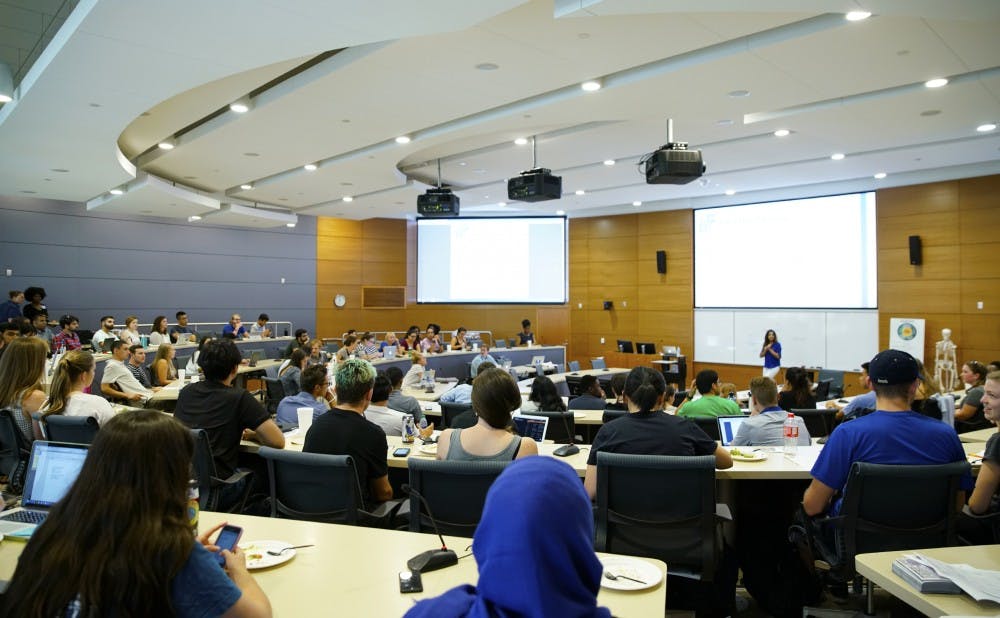The Graduate and Professional Student Council passed a resolution at their Tuesday meeting to support a thorough review of a proposed on-campus Duke Energy power plant and discussed potential graduate student unionization.
Seaver Wang, a third-year graduate student at the Nicholas School of the Environment who presented the resolution, said the project was moving forward too quickly and not transparently enough. A contract between the University and Duke Energy has not been finalized, but should an agreement be reached, the $55 million, 21-megawatt plant would take approximately 18 months to build.
Russell Thompson, director of utilities and engineering services, came to the defense of the faculty who vetted the proposal.
“I understand those who look at this proposal and see [building the facility] as a bad idea,” Thompson said. “Although it may seem counterintuitive, it may reduce fossil fuel emissions by 40 to 45 percent. We worked hard to vet these numbers.”
Prasad Kasibhatla, a professor of environmental chemistry, also addressed the council to say he will not take a public stance on whether or not the facility should be built. However, he encouraged the council take a closer look at the facility's potential consequences, especially if the cost of building it is transmitted to other energy consumers in North Carolina.
“On its surface this sounds like a great deal. Duke invests seven million and 55 million dollars come from Duke Energy. Duke saves two million dollars in fuel costs [per year]," Kasibhatla said. "Who pays for it? It will ultimately be paid by everyone else who is a Duke Energy customer in the state.”
Kasibhatla and other professors in the Nicholas School of the Environment will be releasing a document Wednesday calling for further discussion—including on alternate accounting systems, reinvestment of the savings on energy into the community and potentially switching the facility toward biogas.
Undergraduates in the Duke Climate Coalition appeared at the meeting, supporting the resolution.
Health insurance
GPSC also discussed a recent Internal Revenue Service guidance that impacts student health insurance, following a presentation by Amy Hafez, a graduate student in the School of Medicine.
The guidance raises questions as to whether colleges and universities will be able to offer subsidized student health insurance plans starting Fall 2017 due to provisions of the Affordable Care Act. Hafez advocated working with North Carolina congressmen to have the IRS clarify whether or not universities can still provide graduate students with subsidized student health insurance plans. If that fails, she said, students should “urge the graduate school to increase the graduate student stipend to cover the cost of health insurance.”
Some members of the council, however, suggested that increasing the stipend may put graduate students in a different tax bracket—which would also increase financial hardship.
Colleen McClean, a MD/Ph.D candidate and member of The Chronicle's independent Editorial Board, then presented data she collected comparing the graduate student insurance plan Student Blue to the Duke Select Plan offered to faculty.
Based on her analysis, faculty members had much lower out-of-pocket costs for similar procedures—including ambulance ride, office visits with a blood draw and x-rays, gynecological exams, MRIs and prenatal care. McClean recommended that graduate students advocate for Duke Select health insurance, even though they are only considered part-time employees.
Unionization
GPSC also discussed the potential of forming a graduate student labor union.
As a result of a decision by the National Labor Relations Board in August, graduate students at private universities are now able to unionize.
Jacqueline Robinson-Hamm, a graduate student in the department of biomedical engineering, advocated for the union.
“All of us contribute greatly to the school,” Robinson-Hamm said. “We teach, we grade papers and we mentor undergraduates formally and informally.”
She mentioned that students in states more favorable to unionization, unlike North Carolina, have been unionized for many years.
“Overall there’s a very large national movement toward recognizing graduate students as workers and not just students,” Robinson-Hamm said.
The unionization movement is approaching the 30 percent of students needed for the NLRB to mail a ballot to all graduate students to vote for or against unionization, Robinson-Hamm said. In order for the union to be formed, a majority of students must vote in favor of it. Non-tenure track faculty unionized last year.
In other business:
A trial session for the OneDuke Access Fund, a GPSC initiative designed to give an emergency $200 stipend to six graduate or professional students each month, will begin Oct. 24.
Travis Knoll, a graduate student in the department of history, was approved as the chair of the Young Trustees screening committee.
Will Barclay, a third-year graduate student in the department of immunology, was confirmed as an Attorney General—replacing the previous attorney general who resigned.
Three positions for graduate students are open on the Hate and Bias Committee, which was recommended by the task force on hate and bias issues after it released a report last summer. One executive member, one member of the general assembly and one student not in the general assembly will be selected after the Oct. 28. deadline.
Correction: Seaver Wang is a third-year graduate student, not a second-year. The Chronicle regrets the error.
Get The Chronicle straight to your inbox
Signup for our weekly newsletter. Cancel at any time.

